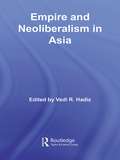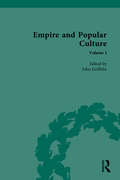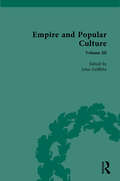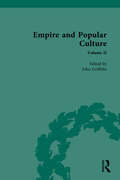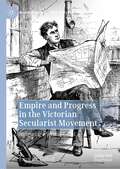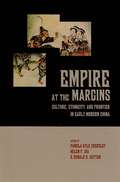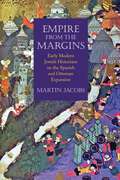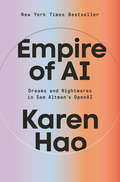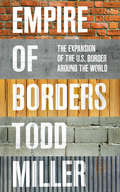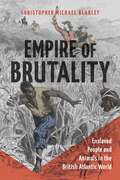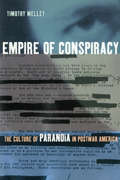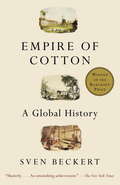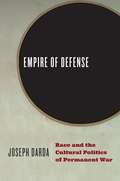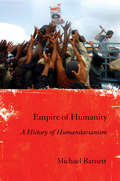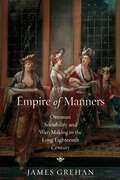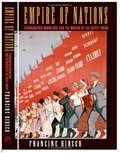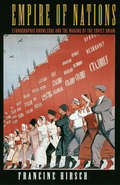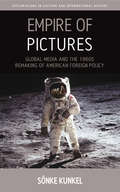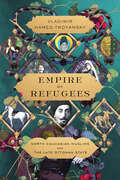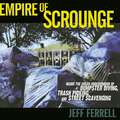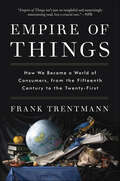- Table View
- List View
Empire and Neoliberalism in Asia (Politics in Asia)
by Vedi R. HadizThis book analyzes the overall effect of American primacy on social and political conflicts in Asia, discussing how the post-Cold War American agenda does not promote democratization in the region, in contradiction to one of the major proclaimed aims of the proponents of the Pax Americana. This team of renowned scholars argue that the US agenda can strengthen anti-democratic impulses in Asian societies, exacerbating and complicating existing domestic conflicts and struggles. Empire and Neoliberalism in Asia also examines how the requirements of the War on Terror intersect with, and reinforce, those of transnationalized sections of American capital. Drawing on country case studies, this multidisciplinary book looks at the ramifications of the American Empire for the Asian region and will appeal to anyone interested in Asian politics, international relations, political economy, development studies and sociology.
Empire and Popular Culture: Volume I
by John GriffithsFrom 1830, if not before, the Empire began to permeate the domestic culture of Empire nations in many ways. From consumables, to the excitement of colonial wars, celebrations relating to events in the history of Empire, and the construction of Empire Day in the early Edwardian period, most citizens were encouraged to think of themselves not only as citizens of a nation but of an Empire. Much of the popular culture of the period presented Empire as a force for ‘civilisation’ but it was often far from the truth and rather, Empire was a repressive mechanism designed ultimately to benefit white settlers and the metropolitan economy. This four volume collection on Empire and Popular Culture contains a wide array of primary sources, complemented by editorial narratives which help the reader to understand the significance of the documents contained therein. It is informed by the recent advocacy of a ‘three-nation’ approach to Empire containing documents which view Empire from the perspective of England, Scotland and Wales and will also contain material produced for Empire audiences, as well as indigenous perspectives. The sources reveal both the celebratory and the notorious sides of Empire. These volumes focus on institutions and popular culture such as clubs, societies, missions, churches, educational institutions and the ways in which people were depicted in popular culture – from heroic explorers to the fascination with and racism towards, indigenous peoples across the long nineteenth century.
Empire and Popular Culture: Volume I
by John GriffithsFrom 1830, the British Empire began to permeate the domestic culture of Empire nations in many ways. This, the fourth volume of Empire and Popular Culture, explores the representation of the Empire in popular media such as newspapers, contemporary magazines and journals and in literature such as novels, works of non-fiction, in poems and ballads.
Empire and Popular Culture: Volume I (Routledge Historical Resources)
by John GriffithsFrom 1830, if not before, the Empire began to permeate the domestic culture of Empire nations in many ways. From consumables, to the excitement of colonial wars, celebrations relating to events in the history of Empire, and the construction of Empire Day in the early Edwardian period, most citizens were encouraged to think of themselves not only as citizens of a nation but of an Empire. Much of the popular culture of the period presented Empire as a force for ‘civilisation’ but it was often far from the truth and rather, Empire was a repressive mechanism designed ultimately to benefit white settlers and the metropolitan economy. This four volume collection on Empire and Popular Culture contains a wide array of primary sources, complimented by editorial narratives which help the reader to understand the significance of the documents contained therein. It is informed by the recent advocacy of a ‘four-nation’ approach to Empire containing documents which view Empire from the perspective of England, Scotland Ireland and Wales and will also contain material produced for Empire audiences, as well as indigenous perspectives. The sources reveal both the celebratory and the notorious sides of Empire. In this, the third volume of Empire and Popular Culture, documents are presented that shed light on three principal themes: The shaping of personal. collective and national identities of British citizens by the Empire; the commemoration of individuals and collective groups who were noted for their roles in Empire building; and finally, the way in which the Empire entered popular culture by means of trade with the Empire and the goods that were imported.
Empire and Popular Culture: Volume II
by John GriffithsFrom 1830, if not before, the Empire began to permeate the domestic culture of Empire nations in many ways. From consumables, to the excitement of colonial wars, celebrations relating to events in the history of Empire, and the construction of Empire Day in the early Edwardian period, most citizens were encouraged to think of themselves not only as citizens of a nation but of an Empire. Much of the popular culture of the period presented Empire as a force for ‘civilisation’ but it was often far from the truth and rather, Empire was a repressive mechanism designed ultimately to benefit white settlers and the metropolitan economy. This four volume collection on Empire and Popular Culture contains a wide array of primary sources, complimented by editorial narratives which help the reader to understand the significance of the documents contained therein. It is informed by the recent advocacy of a ‘four-nation’ approach to Empire containing documents which view Empire from the perspective of England, Scotland Ireland and Wales and will also contain material produced for Empire audiences, as well as indigenous perspectives. The sources reveal both the celebratory and the notorious sides of Empire. This volume considers the ways in which ‘Empire’ permeated the British public sphere, exploring exhibitions, spectacle and entertainment.
Empire and Progress in the Victorian Secularist Movement: Imagining a Secular World (Histories of the Sacred and Secular, 1700–2000)
by Patrick J. CorbeilThis book is the first extensive historical analysis of the relationship between empire and the Victorian secularist movement. Historians have paid little attention to the role of empire in the development of organized free thought. Secularism as it developed in Britain and its settler colonies was an overtly outward-looking, global ideology in a period marked by the rise of scientific rationalism and belief in the logic of a European civilizing mission. Recent scholarship has focused on how the empire influenced British and American atheists on the question of race. What is missing is an in-depth examination of the formation of secularist ideas about universal progress, ethics, and secular morality. Through an examination of the secularist periodical and pamphlet press, this book argues that the religious diversity of the British Empire helped to shape the ethical worldview of the secularists, providing ammunition for their critiques of Christian morality and the church and justification for their policy reform proposals both in Britain and the colonies.
Empire at the Margins: Culture, Ethnicity, and Frontier in Early Modern China
by Pamela Kyle Crossley Helen Siu Donald SuttonFocusing on the Ming (1368-1644) and (especially) the Qing (1364-1912) eras, this book analyzes crucial moments in the formation of cultural, regional, and religious identities. The contributors examine the role of the state in a variety of environments on China's "peripheries," paying attention to shifts in law, trade, social stratification, and cultural dialogue.
Empire from the Margins: Early Modern Jewish Historians on the Spanish and Ottoman Expansion (Jewish Culture and Contexts)
by Martin JacobsThe writings of three early modern Jewish historians highlight the divided allegiances of a Jewish diaspora living in and between the Spanish and Ottoman empiresIn 1492, the year that marked the start of Spain’s transatlantic expansion, the Spanish monarchs expelled their Jewish subjects and triggered a mass Jewish migration to the lands of the Ottoman Empire. But while the rise of these rival empires had tremendous impact on the Jewish population’s geography, the historical accounts of contemporary Jews have remained peripheral to the study of early modern imperialism.In Empire from the Margins, Martin Jacobs seeks to understand how the history of empires appears through the lens of marginalized communities and to explore how Jews responded to Spanish and Ottoman imperial expansion. He approaches this history through the Hebrew chronicles of three sixteenth- and seventeenth-century Jewish authors. Elijah Capsali of Crete, Joseph ha-Kohen of Genoa, and Joseph Sambari of Cairo all lived in early modern hubs with global connections, and—in unusual detail for premodern Jewish historians—they described how the Spanish and Ottoman empires redrew the political, cultural, and religious map of the Mediterranean region while simultaneously transforming the transatlantic world.As Jews, these writers belonged to an ethno-religious minority within the Mediterranean basin where the Spanish and Ottoman empires were centered, and from here they expressed marginalized views on the Spanish and Ottoman regimes. At the same time, these Jewish authors belonged to Jewish networks that transcended imperial boundaries, and they voiced conflicting loyalties between different authorities and cultures. And Jacobs shows that, in writing about the Spanish and Ottoman expansion, these authors also grappled with the Jews’ precarious position in their host societies and their own multilayered identities. Their shifting positionalities illuminate the divided allegiances of a Jewish diaspora living in and between competing empires.
Empire in British Girls’ Literature and Culture
by Michelle J. SmithWhile the gender and age of the girl may seem to remove her from any significant contribution to empire, this book provides both a new perspective on familiar girls' literature, and the first detailed examination of lesser-known fiction relating the emergence of fictional girl adventurers, castaways and 'ripping' schoolgirls to the British Empire.
Empire in the Air: Airline Travel and the African Diaspora (Social Transformations in American Anthropology #1)
by Chandra D. BhimullHonorable Mention, 2019 Victor Turner Prize in Ethnographic Writing, given by the Society for Humanistic AnthropologyHonorable Mention, 2019 Sharon Stephens Prize, given by the American Ethnological SocietyExamines the role that race played in the inception of the airline industryEmpire in the Air is at once a history of aviation, and an examination of how air travel changed lives along the transatlantic corridor of the African diaspora. Focusing on Britain and its Caribbean colonies, Chandra Bhimull reveals how the black West Indies shaped the development of British Airways.Bhimull offers a unique analysis of early airline travel, illuminating the links among empire, aviation and diaspora, and in doing so provides insights into how racially oppressed people experienced air travel. The emergence of artificial flight revolutionized the movement of people and power, and Bhimull makes the connection between airplanes and the other vessels that have helped make and maintain the African diaspora: the slave ships of the Middle Passage, the tracks of the Underground Railroad, and Marcus Garvey’s black-owned ocean liner.As a new technology, airline travel retained the racialist ideas and practices that were embedded in British imperialism, and these ideas shaped every aspect of how commercial aviation developed, from how airline routes were set, to who could travel easily and who could not.The author concludes with a look at airline travel today, suggesting that racism is still enmeshed in the banalities of contemporary flight.
Empire of AI: Dreams and Nightmares in Sam Altman's OpenAI
by Karen HaoAn Instant New York Times Bestseller&“A bestselling page-turner that has made waves not just in Silicon Valley but around the world . . . With Empire of AI, Hao is fundamentally shaping many people&’s perceptions and understanding of the company at the center of the AI revolution.&” —TIME Magazine, &“TIME100 AI 2025&”&“Excellent and deeply reported.&” —Tim Wu, The New York Times&“Startling and intensely researched . . . an essential account of how OpenAI and ChatGPT came to be and the catastrophic places they will likely take us.&” —Vulture&“Hao&’s reporting inside OpenAI is exceptional, and she&’s persuasive in her argument that the public should focus less on A.I.&’s putative &‘sentience&’ and more on its implications for labor and the environment.&” —Benjamin Wallace-Wells, New YorkerFrom a brilliant longtime AI insider with intimate access to the world of Sam Altman's OpenAI from the beginning, an eye-opening account of arguably the most fateful tech arms race in history, reshaping the planet in real time, from the cockpit of the company that is driving the frenzyWhen AI expert and investigative journalist Karen Hao first began covering OpenAI in 2019, she thought they were the good guys. Founded as a nonprofit with safety enshrined as its core mission, the organization was meant, its leader Sam Altman told us, to act as a check against more purely mercantile, and potentially dangerous, forces. What could go wrong?Over time, Hao began to wrestle ever more deeply with that question. Increasingly, she realized that the core truth of this massively disruptive sector is that its vision of success requires an almost unprecedented amount of resources: the &“compute&” power of high-end chips and the processing capacity to create massive large language models, the sheer volume of data that needs to be amassed at scale, the humans &“cleaning up&” that data for sweatshop wages throughout the Global South, and a truly alarming spike in the usage of energy and water underlying it all. The truth is that we have entered a new and ominous age of empire: only a small handful of globally scaled companies can even enter the field of play. At the head of the pack with its ChatGPT breakthrough, how would OpenAI resist such temptations?Spoiler alert: it didn&’t. Armed with Microsoft&’s billions, OpenAI is setting a breakneck pace, chased by a small group of the most valuable companies in human history—toward what end, not even they can define. All this time, Hao has maintained her deep sourcing within the company and the industry, and so she was in intimate contact with the story that shocked the entire tech industry—Altman&’s sudden firing and triumphant return. The behind-the-scenes story of what happened, told here in full for the first time, is revelatory of who the people controlling this technology really are. But this isn&’t just the story of a single company, however fascinating it is. The g forces pressing down on the people of OpenAI are deforming the judgment of everyone else too—as such forces do. Naked power finds the ideology to cloak itself; no one thinks they&’re the bad guy. But in the meantime, as Hao shows through intrepid reporting on the ground around the world, the enormous wheels of extraction grind on. By drawing on the viewpoints of Silicon Valley engineers, Kenyan data laborers, and Chilean water activists, Hao presents the fullest picture of AI and its impact we&’ve seen to date, alongside a trenchant analysis of where things are headed. An astonishing eyewitness view from both up in the command capsule of the new economy and down where the real suffering happens, Empire of AI pierces the veil of the industry defining our era.
Empire of Borders: The Expansion of the US Border Around the World
by Todd MillerThe United States is outsourcing its border patrol abroad--and essentially expanding its borders in the processThe twenty-first century has witnessed the rapid hardening of international borders. Security, surveillance, and militarization are widening the chasm between those who travel where they please and those whose movements are restricted. But that is only part of the story. As journalist Todd Miller reveals in Empire of Borders, the nature of US borders has changed. These boundaries have effectively expanded thousands of miles outside of US territory to encircle not simply American land but Washington’s interests. Resources, training, and agents from the United States infiltrate the Caribbean and Central America; they reach across the Canadian border; and they go even farther afield, enforcing the division between Global South and North. The highly publicized focus on a wall between the United States and Mexico misses the bigger picture of strengthening border enforcement around the world. Empire of Borders is a tremendous work of narrative investigative journalism that traces the rise of this border regime. It delves into the practices of “extreme vetting,” which raise the possibility of “ideological” tests and cyber-policing for migrants and visitors, a level of scrutiny that threatens fundamental freedoms and allows, once again, for America’s security concerns to infringe upon the sovereign rights of other nations. In Syria, Guatemala, Kenya, Palestine, Mexico, the Philippines, and elsewhere, Miller finds that borders aren’t making the world safe—they are the frontline in a global war against the poor.
Empire of Brutality: Enslaved People and Animals in the British Atlantic World
by Christopher Michael BlakleyIn the early modern British Atlantic world, the comparison of enslaved people to animals, particularly dogs, cattle, or horses, was a common device used by enslavers to dehumanize and otherwise reduce the existence of the enslaved. Letters, memoirs, and philosophical treatises of the enslaved and formerly enslaved bear testament to the methods used to dehumanize them. In Empire of Brutality, Christopher Michael Blakley explores how material relationships between enslaved people and animals bolstered the intellectual dehumanization of the enslaved. By reconsidering dehumanization in the light of human–animal relations, Blakley offers new insights into the horrific institution later challenged by Black intellectuals in multiple ways.Using the correspondence of the Royal African Company, specimen catalogs and scientific papers of the Royal Society, plantation inventories and manuals, and diaries kept by slaveholders, Blakley describes human–animal networks spanning from Britain’s slave castles and outposts throughout western Africa to plantations in the Caribbean and American Southeast. They combine approaches from environmental history, history of science, and philosophy to examine slavery from the ground up and from the perspectives of the enslaved. Blakley’s work reveals how African captives who became commodified through exchanges of cowry sea snails between slavers in the Bight of Benin later went on to collect zoological specimens in Barbados and Virginia for institutions such as the Royal Society. On plantations, where enslaved people labored alongside cattle, donkeys, horses, and other animals to make the agricultural fortunes of slaveholders, Blakley shows how the enslaved resisted these human–animal pairings by stealing animals for their own purposes—such as fugitives who escaped their slaveholder’s grasp by riding stolen horses. Because of experiences like these, writers and thinkers of African descent who survived slavery later attacked the institution in public as fundamentally dehumanizing, one that corrupted the humanity of both slaveholders and the enslaved.
Empire of Conspiracy: The Culture of Paranoia in Postwar America
by Timothy MelleyWhy, Timothy Melley asks, have paranoia and conspiracy theory become such prominent features of postwar American culture? In Empire of Conspiracy, Melley explores the recent growth of anxieties about thought-control, assassination, political indoctrination, stalking, surveillance, and corporate and government plots. At the heart of these developments, he believes, lies a widespread sense of crisis in the way Americans think about human autonomy and individuality. Nothing reveals this crisis more than the remarkably consistent form of expression that Melley calls "agency panic"—an intense fear that individuals can be shaped or controlled by powerful external forces. Drawing on a broad range of forms that manifest this fear—including fiction, film, television, sociology, political writing, self-help literature, and cultural theory—Melley provides a new understanding of the relation between postwar American literature, popular culture, and cultural theory.Empire of Conspiracy offers insightful new readings of texts ranging from Joseph Heller's Catch-22 to the Unabomber Manifesto, from Vance Packard's Hidden Persuaders to recent addiction discourse, and from the "stalker" novels of Margaret Atwood and Diane Johnson to the conspiracy fictions of Thomas Pynchon, William Burroughs, Don DeLillo, and Kathy Acker. Throughout, Melley finds recurrent anxieties about the power of large organizations to control human beings. These fears, he contends, indicate the continuing appeal of a form of individualism that is no longer wholly accurate or useful, but that still underpins a national fantasy of freedom from social control.
Empire of Cotton: A Global History
by Sven BeckertThe epic story of the rise and fall of the empire of cotton, its centrality to the world economy, and its making and remaking of global capitalism. Cotton is so ubiquitous as to be almost invisible, yet understanding its history is key to understanding the origins of modern capitalism. Sven Beckert's rich, fascinating book tells the story of how, in a remarkably brief period, European entrepreneurs and powerful statesmen recast the world's most significant manufacturing industry, combining imperial expansion and slave labor with new machines and wage workers to change the world. Here is the story of how, beginning well before the advent of machine production in the 1780s, these men captured ancient trades and skills in Asia, and combined them with the expropriation of lands in the Americas and the enslavement of African workers to crucially reshape the disparate realms of cotton that had existed for millennia, and how industrial capitalism gave birth to an empire, and how this force transformed the world. The empire of cotton was, from the beginning, a fulcrum of constant global struggle between slaves and planters, merchants and statesmen, workers and factory owners. Beckert makes clear how these forces ushered in the world of modern capitalism, including the vast wealth and disturbing inequalities that are with us today. The result is a book as unsettling as it is enlightening: a book that brilliantly weaves together the story of cotton with how the present global world came to exist.From the Hardcover edition.
Empire of Defense: Race and the Cultural Politics of Permanent War
by Joseph DardaEmpire of Defense is an extensive and multilayered critique of the past seventy years of American military engagement. Joseph Darda exposes how the post–World War II formation of the Department of Defense and the subsequent Korean War set a course for decades of permanent conflict. Conflict, which the United States, he argues, ingeniously reframed as the defense of humanity from illiberal beliefs and behaviors. Empire of Defense shows how a string of rationales for war from the 1940s to the present—anticommunism, crime control, humanitarianism, and counterterrorism—paved the way for unprecedented military growth that secured rather than dismantled the existing racial order. A wide range of writers, filmmakers, and journalists—from I. F. Stone and Ishmael Reed to Stanley Kubrick and June Jordan—have struggled to tell the story of war without end, and Darda reveals how that struggle itself tells the bigger story. He draws a clear line from the Cold War to the war on terror and makes sense of our collective cultural efforts to recognize the not-so-new normal of nonstop military empire-building.
Empire of Humanity: A History of Humanitarianism
by Michael BarnettEmpire of Humanity explores humanitarianism’s remarkable growth from its humble origins in the early nineteenth century to its current prominence in global life. In contrast to most contemporary accounts of humanitarianism that concentrate on the last two decades, Michael Barnett ties the past to the present, connecting the antislavery and missionary movements of the nineteenth century to today’s peacebuilding missions, the Cold War interventions in places like Biafra and Cambodia to post–Cold War humanitarian operations in regions such as the Great Lakes of Africa and the Balkans; and the creation of the International Committee of the Red Cross in 1863 to the emergence of the major international humanitarian organizations of the twentieth century. Based on extensive archival work, close encounters with many of today’s leading international agencies, and interviews with dozens of aid workers in the field and at headquarters, Empire of Humanity provides a history that is both global and intimate. Avoiding both romanticism and cynicism, Empire of Humanity explores humanitarianism’s enduring themes, trends, and, most strikingly, ethical ambiguities. Humanitarianism hopes to change the world, but the world has left its mark on humanitarianism. Humanitarianism has undergone three distinct global ages—imperial, postcolonial, and liberal—each of which has shaped what humanitarianism can do and what it is. The world has produced not one humanitarianism, but instead varieties of humanitarianism. Furthermore, Barnett observes that the world of humanitarianism is divided between an emergency camp that wants to save lives and nothing else and an alchemist camp that wants to remove the causes of suffering. These camps offer different visions of what are the purpose and principles of humanitarianism, and, accordingly respond differently to the same global challenges and humanitarianism emergencies. Humanitarianism has developed a metropolis of global institutions of care, amounting to a global governance of humanity. This humanitarian governance, Barnett observes, is an empire of humanity: it exercises power over the very individuals it hopes to emancipate. Although many use humanitarianism as a symbol of moral progress, Barnett provocatively argues that humanitarianism has undergone its most impressive gains after moments of radical inhumanity, when the "international community" believes that it must atone for its sins and reduce the breach between what we do and who we think we are. Humanitarianism is not only about the needs of its beneficiaries; it also is about the needs of the compassionate.
Empire of Manners: Ottoman Sociability and War-Making in the Long Eighteenth Century (Stanford Ottoman World Series: Critical Studies in Empire, Nature, and Knowledge)
by James GrehanIt is easy to believe that manners are empty gestures, little more than social artifice or practiced etiquette whose sole purpose is to project civility and facilitate social interaction. But if we look more closely, they can tell us much more than we might first suppose, revealing what conventional accounts of state, economy, and religion often ignore. With this book, James Grehan offers a panoramic view of manners and sociability across the eighteenth-century Ottoman Empire, from the Balkans to the Middle East to North Africa. Studying chronicles, biographical dictionaries, and travel accounts, he throws new light on the inner dynamics of Ottoman society during a transitional period in Ottoman history which has too often been misunderstood. Empire of Manners proposes a new way of thinking about the history of manners, arguing that violence and war-making, as much as civility and etiquette, have a central role in shaping them. The eighteenth century proved to be a turning point in this paradoxical relationship between violence and manners as war-making turned into a substantially more complex and costly enterprise, leaving a deeper and wider social footprint. The interplay between violence and manners, an unlikely couple, unexpectedly narrates the Ottoman path to the modern age.
Empire of Nations: Ethnographic Knowledge and the Making of the Soviet Union
by Francine HirschThe book examines the ways in which former imperial ethnographers and local elites provided the Bolsheviks with ethnographic knowledge that shaped the very formation of the Soviet Union.
Empire of Nations: Ethnographic Knowledge and the Making of the Soviet Union
by Francine HirschWhen the Bolsheviks seized power in 1917, they set themselves the task of building socialism in the vast landscape of the former Russian Empire, a territory populated by hundreds of different peoples belonging to a multitude of linguistic, religious, and ethnic groups. Before 1917, the Bolsheviks had called for the national self-determination of all peoples and had condemned all forms of colonization as exploitative. After attaining power, however, they began to express concern that it would not be possible for Soviet Russia to survive without the cotton of Turkestan and the oil of the Caucasus. In an effort to reconcile their anti-imperialist position with their desire to hold on to as much territory as possible, the Bolsheviks integrated the national idea into the administrative-territorial structure of the new Soviet state. In Empire of Nations, Francine Hirsch examines the ways in which former imperial ethnographers and local elites provided the Bolsheviks with ethnographic knowledge that shaped the very formation of the new Soviet Union. The ethnographers--who drew inspiration from the Western European colonial context--produced all-union censuses, assisted government commissions charged with delimiting the USSR's internal borders, led expeditions to study "the human being as a productive force," and created ethnographic exhibits about the "Peoples of the USSR." In the 1930s, they would lead the Soviet campaign against Nazi race theories . Hirsch illuminates the pervasive tension between the colonial-economic and ethnographic definitions of Soviet territory; this tension informed Soviet social, economic, and administrative structures. A major contribution to the history of Russia and the Soviet Union, Empire of Nations also offers new insights into the connection between ethnography and empire.
Empire of Pictures: Global Media and the 1960s Remaking of American Foreign Policy (Explorations in Culture and International History #8)
by Sönke KunkelIn Cold War historiography, the 1960s are often described as a decade of mounting diplomatic tensions and international social unrest. <P><P>At the same time, they were a period of global media revolution: communication satellites compressed time and space, television spread around the world, and images circulated through print media in expanding ways. <P><P>Examining how U.S. policymakers exploited these changes, this book offers groundbreaking international research into the visual media battles that shaped America's Cold War from West Germany and India to Tanzania and Argentina.
Empire of Refugees: North Caucasian Muslims and the Late Ottoman State
by Vladimir Hamed-TroyanskyBetween the 1850s and World War I, about one million North Caucasian Muslims sought refuge in the Ottoman Empire. This resettlement of Muslim refugees from Russia changed the Ottoman state. Circassians, Chechens, Dagestanis, and others established hundreds of refugee villages throughout the Ottoman Balkans, Anatolia, and the Levant. Most villages still exist today, including what is now the city of Amman. Muslim refugee resettlement reinvigorated regional economies, but also intensified competition over land and, at times, precipitated sectarian tensions, setting in motion fundamental shifts in the borderlands of the Russian and Ottoman empires. Empire of Refugees reframes late Ottoman history through mass displacement and reveals the origins of refugee resettlement in the modern Middle East. Vladimir Hamed-Troyansky offers a historiographical corrective: the nineteenth-century Ottoman Empire created a refugee regime, predating refugee systems set up by the League of Nations and the United Nations. Grounded in archival research in over twenty public and private archives across ten countries, this book contests the boundaries typically assumed between forced and voluntary migration, and refugees and immigrants, rewriting the history of Muslim migration in the nineteenth and early twentieth centuries.
Empire of Salons: Conquest and Community in Early Modern Ottoman Lands
by Helen PfeiferA history of the Ottoman incorporation of Arab lands that shows how gentlemanly salons shaped culture, society, and governanceHistorians have typically linked Ottoman imperial cohesion in the sixteenth century to the bureaucracy or the sultan’s court. In Empire of Salons, Helen Pfeifer points instead to a critical but overlooked factor: gentlemanly salons. Pfeifer demonstrates that salons—exclusive assemblies in which elite men displayed their knowledge and status—contributed as much as any formal institution to the empire’s political stability. These key laboratories of Ottoman culture, society, and politics helped men to build relationships and exchange ideas across the far-flung Ottoman lands. Pfeifer shows that salons played a central role in Syria and Egypt’s integration into the empire after the conquest of 1516–17.Pfeifer anchors her narrative in the life and network of the star scholar of sixteenth-century Damascus, Badr al-Din al-Ghazzi (d. 1577), and she reveals that Arab elites were more influential within the empire than previously recognized. Their local knowledge and scholarly expertise competed with, and occasionally even outshone, that of the most powerful officials from Istanbul. Ultimately, Ottoman culture of the era was forged collaboratively, by Arab and Turkophone actors alike.Drawing on a range of Arabic and Ottoman Turkish sources, Empire of Salons illustrates the extent to which magnificent gatherings of Ottoman gentlemen contributed to the culture and governance of empire.
Empire of Scrounge: Inside the Urban Underground of Dumpster Diving, Trash Picking, and Street Scavenging (Alternative Criminology #22)
by Jeff FerrellAn illuminating and personal journey through Jeff Ferrell's eight month odyssey of living off the streets“Patrolling the neighborhoods of central Fort Worth, sorting through trash piles, exploring dumpsters, scanning the streets and the gutters for items lost or discarded, I gathered the city's degraded bounty, then returned home to sort and catalogue the take.”—from the IntroductionIn December of 2001 Jeff Ferrell quit his job as tenured professor, moved back to his hometown of Fort Worth, Texas, and, with a place to live but no real income, began an eight-month odyssey of essentially living off of the street. Empire of Scrounge tells the story of this unusual journey into the often illicit worlds of scrounging, recycling, and second-hand living. Existing as a dumpster diver and trash picker, Ferrell adopted a way of life that was both field research and free-form survival. Riding around on his scrounged BMX bicycle, Ferrell investigated the million-dollar mansions, working-class neighborhoods, middle class suburbs, industrial and commercial strips, and the large downtown area, where he found countless discarded treasures, from unopened presents and new clothes to scrap metal and even food.Richly illustrated throughout, Empire of Scrounge is both a personal journey and a larger tale about the changing values of American society. Perhaps nowhere else do the fault lines of inequality get reflected so clearly than at the curbside trash can, where one person's garbage often becomes another's bounty. Throughout this engaging narrative, full of a colorful cast of characters, from the mansion living suburbanites to the junk haulers themselves, Ferrell makes a persuasive argument about the dangers of over-consumption. With landfills overflowing, today’s highly disposable culture produces more trash than ever before—and yet the urge to consume seems limitless.In the end, while picking through the city's trash was often dirty and unpleasant work, unearthing other people's discards proved to be unquestionably illuminating. After all, what we throw away says more about us than what we keep.
Empire of Things: How We Became a World of Consumers, from the Fifteenth Century to the Twenty-First
by Frank TrentmannWhat we consume has become a central—perhaps the central—feature of modern life. Our economies live or die by spending, we increasingly define ourselves by our possessions, and this ever-richer lifestyle has had an extraordinary impact on our planet. How have we come to live with so much stuff, and how has this changed the course of history?In Empire of Things, Frank Trentmann unfolds the extraordinary story of our modern material world, from Renaissance Italy and late Ming China to today’s global economy. While consumption is often portrayed as a recent American export, this monumental and richly detailed account shows that it is in fact a truly international phenomenon with a much longer and more diverse history. Trentmann traces the influence of trade and empire on tastes, as formerly exotic goods like coffee, tobacco, Indian cotton and Chinese porcelain conquered the world, and explores the growing demand for home furnishings, fashionable clothes and convenience that transformed private and public life. The nineteenth and twentieth centuries brought department stores, credit cards and advertising, but also the rise of the ethical shopper, new generational identities and, eventually, the resurgence of the Asian consumer.With an eye to the present and future, Frank Trentmann provides a long view on the global challenges of our relentless pursuit of more—from waste and debt to stress and inequality. A masterpiece of research and storytelling many years in the making, Empire of Things recounts the epic history of the goods that have seduced, enriched and unsettled our lives over the past six hundred years.
